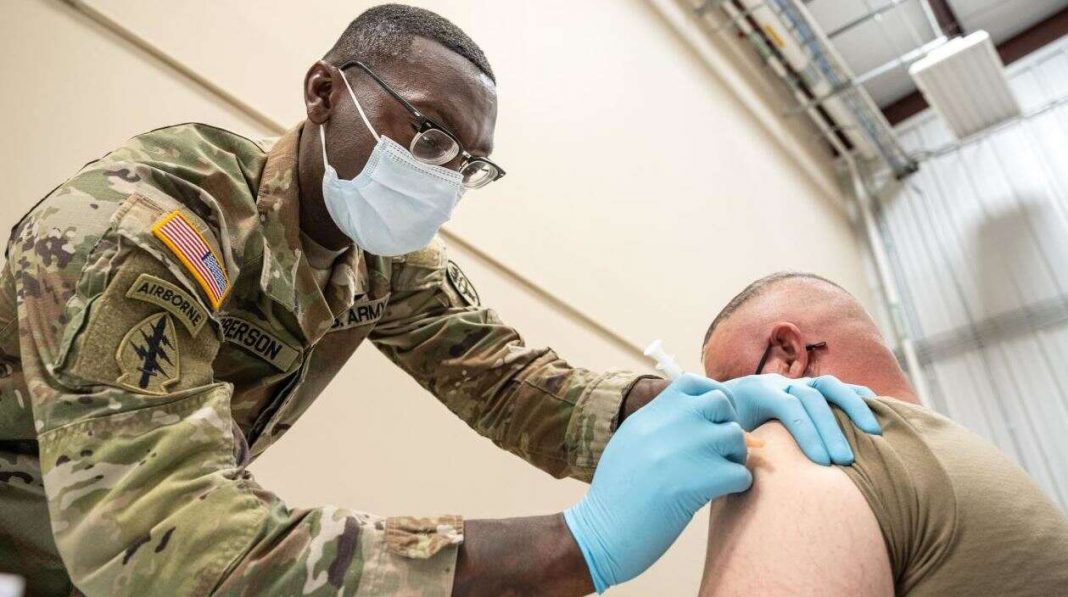An $858 billion defence policy bill that would rescind the Pentagon’s mandate that troops receive the coronavirus vaccine was approved by the House on Thursday with an overwhelming majority vote. This was accomplished in spite of objections raised by the Biden administration, as lawmakers from both parties came together in support of yet another significant increase in military spending.
The legislation, which was negotiated by Republicans and Democrats in both chambers of Congress, would provide a raise of 4.6 percent to military personnel and increase the budget of the Pentagon by $45 billion over what President Biden requested. Additionally, the legislation would provide $800 million in new security aid to Ukraine and billions to Taiwan. It also contains revisions that legislators wanted to see made to the policy that the military uses for treating allegations of sexual assault, a big success for its proponents that had evaded them for a long time.
The vote came in at 350 to 80, with a significant number of Republicans joining Democrats in favour of the motion.
The plan provides a double rebuke to Mr. Biden’s ideas, raising the total budget for the military by 8 percent while he has been pushing to keep it almost the same, and moving to remove a vaccination requirement that his senior aides have been fighting to protect. And as of January, when Republicans took control of the House, this effectively locked in the type of significant increases in military spending that Mr. Biden and many other Democrats had hoped to stop while they controlled the government as a whole.
A spokesperson for the National Security Council named John F. Kirby referred to the elimination of the vaccination mandate for soldiers as a “mistake” and blamed Republicans, whom he claimed had politicised the measure. Kirby added that Republicans had done this intentionally. However, he did not come out and declare that Mr. Biden would veto the bill.
After Republicans, including Representative Kevin McCarthy of California, the minority leader who is campaigning to be speaker, threatened to sink the bill if it did not include the provision repealing the mandate, Democrats privately stated that they had little choice but to include the measure. McCarthy is running for speaker of the House of Representatives. Because antiwar Democrats on the left often reject proposals of this kind, it could only be passed with the support of Republicans.
It is still essential for the plan to get through the Senate, which is currently deadlocked, where it will need the backing of at least ten Republicans in order to pass the 60-vote barrier that is required for significant legislation to go ahead.
According to Mr. Smith, service members who got their first dosage of the coronavirus vaccination at the beginning of 2021, which would provide them very little protection against new strains of the virus at this time, are eligible to continue serving under the guidelines that are now in place.
The Republicans emphasised the provision as a victory, but they said they intended to press the issue even further once they gained control of the House in January. They stated that they intended to look for ways to reinstate or provide back pay for service members who were dismissed for refusing to take the vaccine. Republicans highlighted the provision as a victory.
Vaccination against a wide variety of infectious diseases is mandatory for personnel of the armed forces. According to the Defense Health Agency, which is in charge of the health care for the armed forces, recruits receive shots protecting them from hepatitis A and B; the flu; measles, mumps, and rubella; meningococcal disease; polio; tetanus, diphtheria, and pertussis; and chickenpox beginning in basic training. These vaccinations are in addition to the Covid-19 vaccine.
Nearly all personnel of the military forces have received at least some level of vaccination against the coronavirus, and the great majority have received the entire course of vaccinations against the virus. But as a result of their refusal to get the vaccination, thousands of service members were let go.
The legislation reflects a growing determination among lawmakers to increase spending on the military in order to counter Russia’s ongoing assault on Ukraine and rising fears about Chinese aggression toward Taiwan. Additionally, the legislation seeks to counter rising concerns about Russian aggression toward Taiwan. It would create a military modernization programme for Taiwan and enhance financing for a Ukrainian security effort above what Mr. Biden had requested. Additionally, it would authorise up to $10 billion in security assistance over the course of the next five years.
And it would approve more than $2.7 billion to bolster the production of munitions, in an effort to counter concerns that the nation’s stockpiles have been depleted as a result of the United States’ attempt to meet Ukraine’s demands for weapons.
Building on revisions to the military justice system that were approved the previous year, this measure would remove commanders’ authority to make decisions about the prosecution of sexual assault cases and provide that authority to independent prosecutors instead. The defence policy measure that was passed the year before permitted military commanders to preserve crucial decision-making abilities, but it stripped them of the majority of the authority that they had to prosecute sexual assaults and a wide variety of other criminal crimes.
The must-pass bill did not include several provisions that lawmakers had hoped to attach to it, including legislation that would have given cannabis companies access to banking institutions; a measure championed by Senator Joe Manchin III, Democrat of West Virginia, that would have made it easier to build a natural gas pipeline in his state; and an overhaul of the Electoral Count Act. However, these provisions were not included in the bill.

